[See related article,
OJJDP Leaders Talk Money, Politics and Advocacy; watch videos from the forum at
http://www.youthtodayexchange.org]
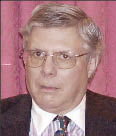 |
|
John Rector
1977-1979
Appointed by Jimmy Carter
|
The Juvenile Justice Act
The motive behind the act, which Rector played a key role in writing as a senior staffer to its chief architect, Sen. Birch Bayh (D-Ind.):
“This was not done to help out those working in the juvenile justice system, with all due respect. The predicate was that the system was failing and it really needed a change. The intervention was excessive; the overreach was excessive. You needed to focus on the really violent conduct, not focus on non-criminal conducts, especially when it came to young women.”
“It was about advocacy. It was about change, reform.”
How much to spend
About grappling over spending with the Law Enforcement Assistance Administration (LEAA), which oversaw OJJDP within the Department of Justice, while he was still on the congressional staff:
[We] wanted money spent in ways different than the way LEAA was spending. … “We got an amendment passed … that required them to continue to spend 19.5 or so percent of their total appropriation for juvenile justice.”
“It was a real thorn in their side. They tried to get it repealed on several occasions.”
Running the office
“I was used to controversy, but it didn’t really help in the office context. … The world I entered had a different culture, to put it mildly.”
“We knew we had a couple of years and it would be exit time,” because a potential change of presidential administrations would mean a change in leadership at OJJDP. “We knew the clock was ticking. We weren’t there to be long-termers. We were there to do a few things, like allocate the money, try to implement the act and hit the road.”
Some controversies
“One thing that became very controversial: The discretionary funds, the special emphasis funds, went through the criminal justice state planning agencies. Well, we changed that. We put it into the Federal Register … and opened it up in the world” for competitive bidding. “That probably caused me more grief … than most of the things we did.”
Getting the job
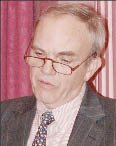 |
|
Alfred S. Regnery
1983-1987
Appointed by Ronald Reagan
|
“I want to tell you a little bit, first of all, about how I got there, because I know that was always sort of a mystery. [Audience laughter.] It was for me, too.”
He says he was called in by Attorney General William French Smith. “He said, ‘We have this office across the street that has a bunch of money to give away. … We’d like you to go over and run it.’ So I said, ‘Frankly, I don’t know anything about it.’ He said, ‘That’s OK, you can figure it out. It’s not rocket science.’ ”
Freedom of speech
“I could go off and give a speech anywhere I wanted. I could say what I wanted to say, had to get nothing cleared. I wrote op-ed pieces. I appeared on radio and television constantly on juvenile justice issues.
“I irritated a lot of people, I guess, in the process, but that didn’t bother me, because I was getting strong support both from the attorney general’s office and from the Senate,” which the Republicans controlled.
Conservative shift
“The focus of the office was to change. … What they [Reagan administration officials] said was, ‘We want to change the orientation to protect crime victims, … to zero in on chronic juvenile violent offenders,’ and that is what I was told I was supposed to do.
Working with OJJDP staff
“I was told, ‘You’ve got this left-wing staff that’s going to try to stop everything you do.’ It wasn’t true. They were extremely supportive and helpful. With just a very few exceptions, the staff was a great benefit. They gave me lots of ideas.”
“In the first meeting I had there, I said, ‘Look I’m a conservative, I’m a Reaganite. Here’s what I want to do. If you don’t like it, you can leave. If you want to help me out, I’d be happy to have your help.’
“I knew there were a lot of people who wouldn’t like it” both in the office and the juvenile justice field.
He turned to John Rector: “I think you said the same thing. I didn’t go there to try to be popular. So I guess we didn’t.” [Audience laughter.]
Grant making and earmarks
Said to Rector: “When you wrote the bill, and Birch Bayh did, you gave the administrator a lot of discretion, so that you could do it, probably never thinking that a guy like me would come along and use that discretion instead.” [Audience laughter.]
“The way earmarks have accelerated in this is really shocking.” When I was there, none of it was” earmarked. “I think the whole earmark question is an outrage.”
A critical change in the act
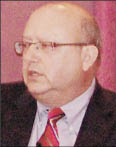 |
|
Ira Schwartz
1979-1981
Appointed by Jimmy Carter
|
Discussing the 1980 reauthorization of the Juvenile Justice and Delinquency Prevention Act:
“One of the things I was most proud of was the amendment to remove children from adult jails. It was a policy that was based on very good information, very good data.
“It [the data] helped me to convince Charlie Renfrew, who was the deputy attorney general, and Ben Civiletti, who was the attorney general, that this was the right thing to do. … It really was an easy sell, because we had good information.
“I remember sitting before Congress … when Charles Renfrew proposed this amendment to Congress. It just gave me goose bumps, and how proud I was of the United States Department of Justice.
“Also, the fact that I think it was implemented very, very successfully. It really was an effective policy.”
More research needed
“I would think that juvenile justice today would be a lot further along if we had invested more in research and if we had tried to tackle some of the tough questions of the day. … You all know the term ‘evidence-based practice.’ There’s a lot of rhetoric there and a lot less substance than I think we all would like.”
“If I had to do it all over again I would have invested more in that. … I think we should invest in some clinical trials to test out some interventions that are based upon good research.”
Transitioning to the job
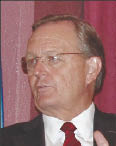 |
|
Verne L. Speirs
1987-1988
Appointed by Ronald Reagan
|
The administrators all said there was no real transition process for one of them to talk with a predecessor, including Speirs’ predecessor, Alfred Regnery:
“I think I’ve talked to Al more today than I’ve talked to him any time in our career. … There was not a whole lot of dialogue when we changed leadership positions.”
Inherent conflicts
Discussing how OJJDP has to help bring together services among forces that are sometime in conflict:
“We know that prevention didn’t get along with law enforcement. Law enforcement didn’t particularly like prevention. You had conflicts between the courts and some of the prosecutors. You had problems with detention and release and field services. You had systems that weren’t working together.”
Current issues
“There a propensity to want to lock up status offenders. There’s pressure from the courts, pressure from the school districts. They want to put truants back into secure detention.”
“The other is the issue of evidence-based programming. We throw that name around. … If I could look back and say any area that maybe should have been promoted a little more aggressively by myself, it was research, and looking at the areas we needed to pay attention. Practices based on research is probably one of the biggest elements we need to look to in the future for juvenile justice.”
Getting the Job
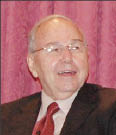 |
|
Robert Sweet
1990-1992
Appointed by George H.W. Bush
|
He got a call from John Sununu, President George H.W. Bush’s chief of staff:
“He said, ‘We’d like you to serve as administrator of OJJDP.’ I said, alright, OJJDP, what’s that? I didn’t have very much knowledge of what I was getting into.”
“I had a tough confirmation” hearing in the Senate. “I was over-briefed. … I didn’t know the programs well enough to be able to articulate before a Senate committee how to solve all the juvenile justice problems in the United States of America. That’s what [Sen.] Joe Biden asked me.”
The OJJDP staff
“I came into a very difficult situation. I came into a staff that was dispirited, discouraged, disheartened. … I knew I had a problem.”
Discussing two top staffers who drew up a reorganization plan, which prompted him to have them transferred:
“The fix was in before I ever got there. … They came to me with a plan to reorganize the duties of the staff so that they would be my two deputies. They’d take care of all the work of the staff. They would be working, I found, with the assistant attorney general. … I would have nothing to do. [Audience laughter.] I began to figure it out.”
Conflicts with Department of Justice
“My experience was that the political influence makes it extremely difficult to wend your way through and not get dinged by it.”
Discussing demands by the assistant attorney general that OJJDP and several other agencies, such as the Bureau of Justice Assistance, contribute some of their grant money for Justice Department priorities [such as the Weed and Seed program] that might not have been within the funding authority of the agencies:
“We were supposed to pool it [the money] and get with the program. And I thought to myself, well, wait a minute. I’ve been appointed by the president. Confirmed by the Senate. I have a responsibility for this particular statutory law. How am I to contribute unless it’s within the statutory authorities of the law? I couldn’t go along with that.”
On these and other continuing battles with higher-ups in Justice:
“They were very painful years for me and my family, I tell you, just because of the stress of it all.”
A priority
“I knew there was an issue that affected 85 percent of juvenile delinquents. And that is that they cannot read. And I thought, you know, there are ways in the statute, I believe, to address that particular component. I did everything possible to work with people” in the justice field to infuse literacy into their work.
The job
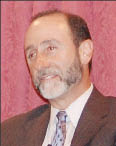 |
|
Shay Bilchik
1994-2000
Appointed by Bill Clinton
|
“That was my burden: this label of being the first prosecutor to head up this office. [Laughs.] It turned out, of course, that it was the very best job of my career. … Certainly the best job in terms of a career path and making a difference in society.”
Support from above is crucial
Says the office succeeded during his tenure because it had strong support from the president, vice president and attorney general:
“One of the lessons learned was this office has tremendous potential if it is empowered to do its work, if it has an attorney general to support it, if the administrator’s allowed to be the voice of juvenile justice. And [it] has an administrator who listens to the field. … That was big difference-maker in terms of my tenure at OJJDP.”
Leadership role of OJJDP
“It has a responsibility as a leadership organization to serve as a learning organization for the country. … To build capacity across the country. … People ask me the question: Is it possible the office is done as a leadership organization? I have no equivocation at all that the answer is no.
“It imbedded a core set of activities and work and focus that lives on. It may not have lived on in the office in the last eight years the way the staff wanted it to. But it’s lived on in communities around the country. And a new leader coming in, I think, will be able to lift that work up again.”
Valid court orders
Discussing the issue of valid court orders (VCOs) and referring to Mary Mentaberry, head of the National Council of Juvenile and Family Court Judges, which has in the past favored VCOs while OJJDP has generally been against them:
“I know Mary Mentaberry from NCJFCJ is in the room. … I don’t want to isolate you, Mary. I know this is an issue we struggle with. But somehow we have to move to get rid of the VCO. We need to simply see it fade into the sunset. [Audience applause.] A new leader coming into OJJDP needs to have that conversation with the judges and others and Congress.”
(The NCJFCJ did not respond to a post-forum request to state its position on VCO.)



































